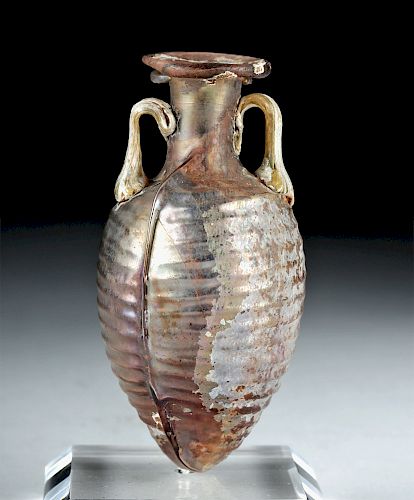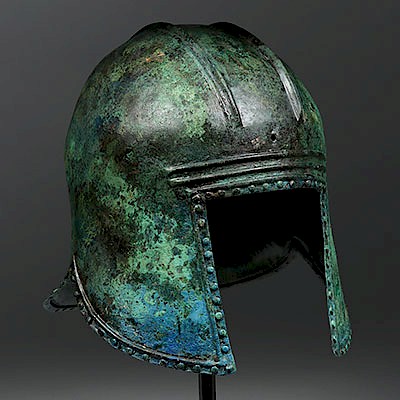Choice Roman Sidonian Glass Amphoriskos, Ex-Christie's
Lot 76c
About Seller
Artemis Gallery
686 S Taylor Ave, Ste 106
Louisville, CO 80027
United States
Selling antiquities, ancient and ethnographic art online since 1993, Artemis Gallery specializes in Classical Antiquities (Egyptian, Greek, Roman, Near Eastern), Asian, Pre-Columbian, African / Tribal / Oceanographic art. Our extensive inventory includes pottery, stone, metal, wood, glass and textil...Read more
Categories
Estimate:
$3,500 - $5,000
Absentee vs Live bid
Two ways to bid:
- Leave a max absentee bid and the platform will bid on your behalf up to your maximum bid during the live auction.
- Bid live during the auction and your bids will be submitted real-time to the auctioneer.
Bid Increments
| Price | Bid Increment |
|---|---|
| $0 | $25 |
| $300 | $50 |
| $1,000 | $100 |
| $2,000 | $250 |
| $5,000 | $500 |
| $10,000 | $1,000 |
| $20,000 | $2,500 |
| $50,000 | $5,000 |
| $100,000 | $10,000 |
| $200,000 | $20,000 |
About Auction
By Artemis Gallery
May 10, 2018
Set Reminder
2018-05-10 10:00:00
2018-05-10 10:00:00
America/New_York
Bidsquare
Bidsquare : Fine Ethnographic / Asian / Ancient Art
https://www.bidsquare.com/auctions/artemis-gallery/fine-ethnographic-asian-ancient-art-3213
Featuring antiquities from around the world including Pre-Columbian, Tribal, Classical, Asian, so much more! Artemis Gallery info@artemisgallery.com
Featuring antiquities from around the world including Pre-Columbian, Tribal, Classical, Asian, so much more! Artemis Gallery info@artemisgallery.com
- Lot Description
Roman Empire, Lebanon, Sidonian, ca. mid 1st to early 2nd century CE. A breathtaking amphoriskos, comprised of translucent aubergine glass, blown in a two-part mold (note the seam running down the length of the body on both sides) and displaying repeating horizontal ridges throughout the body. The cylindrical neck was free blown and resolves to a gently flared, folded rim, and twin green trailed handles join neck to shoulders. An exquisite glass amphoriskos (miniature amphora) once used to hold perfumed oil with gorgeous silvery and rainbow-hued iridescence across the surface. Size: 3" H (7.6 cm); 3.375" H (8.6 cm) on included custom stand.
Here are Pliny's words as he describes his voyage to Sidon, "From this point on we must go back to the coast and to Phoenicia. There was formerly a town called Crocodilian, and there still is a river of that name…Then comes Cape Carmel…Next are Getta, Geba, and the river Pacida or Belus…Close to this river is Ptolemais…Next Tyre, once an island separated from the mainland by a very deep sea-channel 700 yards wide, but now joined to it by the works constructed by Alexander when besieging the place…but the entire renown of Tyre now consists in a shell-fish and a purple dye!…Next are Zarephath and the city of birds (Ornithon oppidum), and Sidon, the mother-city of Thebes in Boeotia where glass is made." (Pliny, Natural History V.75-76, 77-79 CE).
Provenance: private Davis collection, Houston, Texas, USA; ex-Christie's December 13, 2013 New York Antiquities Auction, part of lot 48; ex-Dr. James Burk, Indiana, 1960s-1970s with Sumer Gallery, New York, New York, USA, 1983
All items legal to buy/sell under U.S. Statute covering cultural patrimony Code 2600, CHAPTER 14, and are guaranteed to be as described or your money back.
A Certificate of Authenticity will accompany all winning bids.
We ship worldwide and handle all shipping in-house for your convenience.
#132744Choice condition with marvelous iridescence. Simply superb.Condition
- Shipping Info
-
All shipping is handled in-house for your convenience. Your invoice from Artemis Gallery will include shipping calculation instructions. If in doubt, please inquire BEFORE bidding for estimated shipping costs for individual items.
-
- Buyer's Premium



 EUR
EUR CAD
CAD AUD
AUD GBP
GBP MXN
MXN HKD
HKD CNY
CNY MYR
MYR SEK
SEK SGD
SGD CHF
CHF THB
THB
















